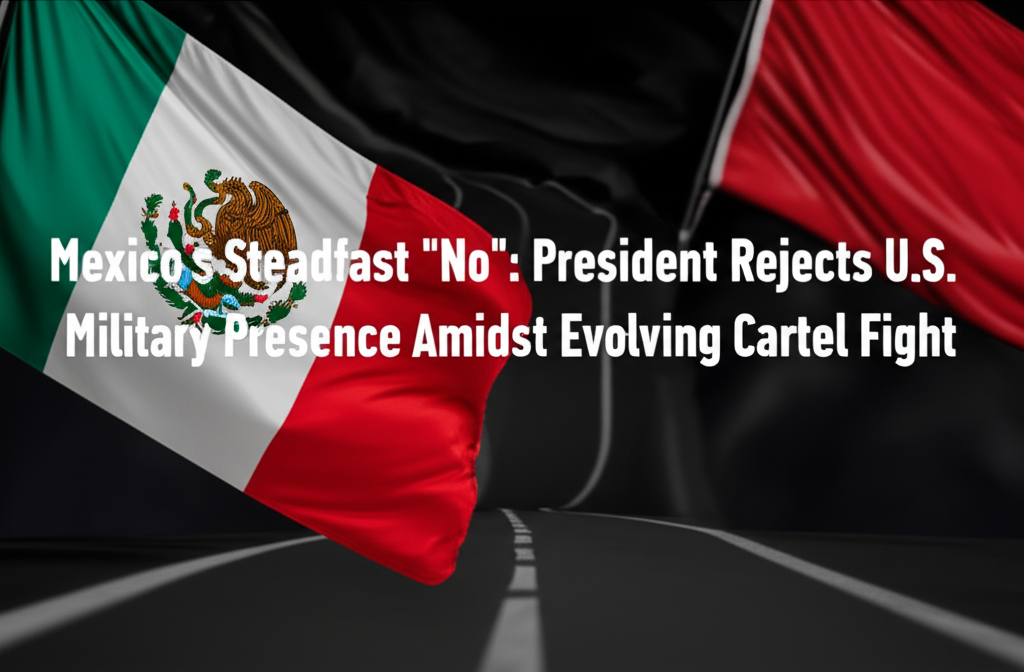Mexico’s Steadfast “No”: President Rejects U.S. Military Presence Amidst Evolving Cartel Fight
As tensions rise over security cooperation, Mexico asserts sovereignty while grappling with the persistent threat of organized crime.
Mexico’s President has unequivocally stated that United States military forces are unwelcome on its soil, a firm declaration that underscores a complex and often fraught relationship concerning the ongoing battle against powerful drug cartels. This stark message arrives at a critical juncture, following what the Mexican government perceived as a significant stride forward in bilateral cooperation, marked by an aggressive domestic crackdown on criminal organizations. The sentiment from Mexico City is clear: while collaboration is valued, the nature and terms of that partnership remain firmly within Mexican control, and the introduction of foreign military personnel is a red line.
The President’s pronouncement, reported by The New York Times, signals a potential recalibration of security strategy and highlights the delicate balance Mexico seeks to maintain between national sovereignty and the shared imperative of combating transnational criminal enterprises. This assertion comes at a time when the influence and violence perpetrated by cartels continue to pose a severe challenge to both Mexico and the United States, necessitating a robust and coordinated response, yet one that respects national boundaries and decision-making authority.
This article delves into the intricate web of factors influencing Mexico’s stance, examining the historical context of U.S.-Mexico security cooperation, the recent shifts in approach, the potential implications of the President’s declaration, and the diverse perspectives on how best to tackle the persistent cartel threat. We will explore the underlying reasons for Mexico’s principled stand, the potential benefits and drawbacks of various cooperation models, and the implications for the future of security in the region.
Context & Background: A History of Uneasy Alliances and Shifting Strategies
The relationship between Mexico and the United States on security matters, particularly concerning drug trafficking and organized crime, is long and complex, often characterized by periods of intense cooperation interspersed with moments of friction and mistrust. For decades, the U.S. has viewed the flow of narcotics across its southern border as a primary national security concern, often advocating for more direct intervention and enhanced operational support for Mexican law enforcement and military agencies.
Mexico, conversely, has historically been sensitive to any perception of foreign encroachment on its sovereignty. The presence of foreign military personnel, even in advisory or support roles, can evoke historical memories of U.S. interventions and is often viewed with suspicion by a significant portion of the Mexican public and political establishment. This sensitivity has shaped the parameters of security cooperation, with Mexico generally preferring to lead its own operations, albeit with varying degrees of U.S. assistance in terms of intelligence, training, and equipment.
The Trump administration, in particular, took a more assertive stance on border security and the fight against cartels, often publicly criticizing Mexico’s efforts and suggesting more forceful measures. This period saw increased pressure from Washington for Mexico to intensify its crackdown, with the U.S. exploring various avenues of support and, at times, contemplating more direct involvement. It was within this atmosphere that the Mexican government, as noted in the summary, believed it had made progress by launching its own aggressive crackdown, aiming to demonstrate its commitment and capability to manage the crisis internally, thereby perhaps preempting more forceful U.S. proposals.
This proactive approach by Mexico was intended to signal a renewed commitment to tackling the cartel problem head-on, projecting an image of strength and self-reliance. The hope was that this demonstrable effort would foster a greater sense of partnership based on mutual respect rather than imposed solutions. However, the current declaration from the President suggests that any discussions or perceived understandings regarding the terms of cooperation may not have fully aligned with U.S. expectations, particularly concerning the permissible level of U.S. involvement on Mexican territory.
The underlying challenge remains multifaceted. Cartels have evolved into sophisticated transnational criminal organizations, engaging in money laundering, human trafficking, extortion, and political corruption, in addition to drug smuggling. Their reach extends beyond Mexico’s borders, posing a significant threat to regional stability and global security. This shared threat necessitates collaboration, but the form that collaboration takes is a constant point of negotiation and contention, deeply intertwined with issues of national pride, historical grievances, and differing political philosophies on security.
In-Depth Analysis: Sovereignty, Strategy, and the Cartel Conundrum
The Mexican President’s firm rejection of U.S. military forces on its territory is not merely a symbolic gesture; it represents a deeply ingrained commitment to national sovereignty and a reflection of Mexico’s strategic autonomy in addressing its internal security challenges. This stance is informed by a nuanced understanding of the cartel problem, which is not solely a law enforcement or military issue, but also deeply rooted in socio-economic disparities, corruption, and historical factors.
From Mexico’s perspective, allowing foreign military forces to operate within its borders, even under the guise of cooperation, could be seen as undermining the authority and capacity of its own security apparatus. It risks creating a dependency that could weaken domestic institutions in the long run and could be politically untenable domestically, potentially fueling nationalist sentiment and accusations of capitulation to U.S. demands. The aggressive crackdown launched by the Mexican government can be interpreted as an effort to assert its own agency and demonstrate that it is capable of managing its security without direct foreign military intervention.
The nature of cartel operations also complicates the strategic calculus. These organizations are not traditional state armies; they are decentralized, adaptable, and deeply embedded within local communities, often through a combination of fear, economic reliance, and corruption. A purely military-centric approach, whether led by Mexican or U.S. forces, may not be sufficient to dismantle these complex networks. Mexico’s approach likely prioritizes a more comprehensive strategy that includes addressing the root causes of crime, strengthening judicial systems, combating corruption, and fostering economic development, in addition to law enforcement and intelligence operations.
Furthermore, the U.S. demand for greater involvement, while perhaps stemming from a desire for more effective cartel disruption, might be perceived by Mexico as failing to acknowledge the distinct challenges and realities on the ground. The U.S. may prioritize immediate results and the interdiction of illicit flows, while Mexico might be focused on long-term stability, state-building, and the rule of law. These differing priorities can lead to divergent approaches to cooperation.
The summary’s mention of a “turnaround” in cooperation suggests that prior to Mexico’s recent crackdown, the relationship might have been characterized by a sense of stagnation or unmet expectations on both sides. Mexico’s proactive domestic measures were likely intended to reset the terms of engagement, shifting from a reactive stance to a proactive one, thereby reclaiming control over the narrative and the operational approach. The current presidential statement, therefore, could be a reassertion of those terms, a clarification that the “cooperation” expected by the U.S. must not infringe upon Mexican sovereignty.
This situation also highlights the potential for unintended consequences when foreign powers exert significant pressure on the internal security policies of other nations. While the U.S. may see its actions as necessary to protect its own citizens and interests, Mexico views the fight against cartels as an internal matter that requires solutions tailored to its unique context. The President’s declaration serves as a strong reminder of this fundamental principle.
Pros and Cons: Evaluating Different Models of Security Cooperation
The Mexican President’s stance on U.S. military involvement, while firm on sovereignty, necessitates an examination of the potential advantages and disadvantages of various cooperation models in combating drug cartels.
Pros of Limited U.S. Military Involvement (as advocated by Mexico):
- Preservation of Sovereignty: Allows Mexico to maintain control over its internal security operations, fostering national pride and self-reliance. This prevents any perception of foreign occupation or undue influence.
- Tailored Strategies: Enables Mexico to develop and implement security strategies that are contextually relevant and address the specific socio-economic and political factors contributing to cartel activity.
- Reduced Public Backlash: Avoids potential public outcry and nationalist backlash that could arise from the presence of foreign military forces, ensuring greater domestic legitimacy for security efforts.
- Focus on Root Causes: Frees up resources and political capital for Mexico to focus on broader strategies that address the underlying causes of crime, such as poverty, inequality, and corruption, rather than solely relying on military solutions.
- Strengthened Domestic Institutions: Encourages the development and empowerment of Mexico’s own law enforcement, judicial, and intelligence agencies, fostering long-term institutional capacity.
Cons of Limited U.S. Military Involvement:
- Resource Constraints: Mexico may face significant resource limitations in terms of funding, advanced technology, and intelligence capabilities compared to the U.S., potentially hindering the effectiveness of its independent operations.
- Slower Progress: The pace of cartel dismantling and violence reduction might be slower without direct, extensive U.S. military support and operational involvement, leading to prolonged instability.
- Intelligence Gaps: Limited U.S. military involvement could mean fewer opportunities for direct intelligence sharing and coordinated action, potentially allowing cartels to exploit these gaps.
- Perception of Inaction: The U.S. public and policymakers might perceive Mexico’s stance as a lack of commitment or insufficient effort, potentially leading to political pressure and strained relations.
- Risk of Escalation of Cartel Power: If Mexico’s domestic crackdown, however aggressive, is not sufficiently effective, cartels could continue to grow in power and influence, posing a greater threat to both nations.
Pros of Increased U.S. Military Involvement:
- Enhanced Capabilities: U.S. military forces often possess superior intelligence, surveillance, reconnaissance (ISR) capabilities, advanced weaponry, and logistical support that could significantly bolster anti-cartel operations.
- Faster Disruption: Direct involvement could lead to quicker dismantling of cartel operations, arrests of key leaders, and interdiction of illicit flows, potentially yielding more immediate results.
- Intelligence Advantage: U.S. intelligence networks are extensive and could provide crucial real-time information and analysis to Mexican counterparts.
- Shared Burden: Distributes the financial and human costs of combating cartels, which are substantial for Mexico.
- Deterrence Effect: A visible U.S. military presence could act as a deterrent to cartel activities.
Cons of Increased U.S. Military Involvement:
- Erosion of Sovereignty: The most significant concern, as it can be perceived as an infringement on Mexico’s right to self-determination and could lead to domestic political instability.
- Blowback and Resentment: Direct military intervention can foster anti-American sentiment and resentment, potentially fueling recruitment for cartels or creating new avenues of resistance.
- Unintended Consequences: Military operations can sometimes lead to civilian casualties or collateral damage, further alienating local populations and complicating long-term stability.
- Risk of Mission Creep: There’s a potential for U.S. involvement to expand beyond initial parameters, becoming more entrenched and difficult to withdraw.
- Focus on Military Solutions: May overshadow the need for comprehensive, non-military approaches to crime, such as judicial reform, economic development, and anti-corruption efforts.
Mexico’s position prioritizes the long-term goal of strengthening its own institutions and maintaining its sovereignty, even if it means potentially slower or more resource-intensive progress in the short term. The aggressive crackdown is an attempt to demonstrate that it can achieve progress on its own terms.
Key Takeaways
- Mexico’s President has stated that U.S. military forces are unwelcome on its territory, emphasizing national sovereignty.
- This declaration follows Mexico’s launch of an aggressive crackdown on cartels, which it believed marked a positive turn in cooperation with the Trump administration.
- The historical relationship between Mexico and the U.S. on security matters is marked by a sensitivity to foreign intervention and a desire for self-determination on Mexico’s part.
- Mexico’s stance reflects a belief in a comprehensive strategy to combat cartels, addressing root causes alongside law enforcement.
- While direct U.S. military support could offer enhanced capabilities and faster results, it carries significant risks to Mexican sovereignty and could foster resentment.
- Mexico’s proactive domestic crackdown is an effort to assert its agency and control over its security strategy.
- The differing priorities between the U.S. (often focused on interdiction and immediate results) and Mexico (often focused on long-term stability and sovereignty) shape their cooperation dynamics.
Future Outlook: Navigating the Tightrope of Cooperation and Sovereignty
The future of U.S.-Mexico security cooperation now hinges on finding a delicate balance between the U.S. desire for robust action against cartels and Mexico’s unwavering commitment to its sovereignty. The President’s clear pronouncement leaves little room for misinterpretation regarding the presence of U.S. military personnel. This necessitates a shift in focus towards alternative, non-military forms of collaboration that can still yield significant results.
Expect to see continued emphasis on intelligence sharing, joint training exercises for Mexican law enforcement and military personnel, capacity building in areas like forensic science and judicial reform, and enhanced efforts in dismantling financial networks that fuel cartel operations. U.S. assistance in interdicting arms trafficking from the U.S. into Mexico will likely remain a crucial point of discussion, as will efforts to address demand for illicit substances in the United States, which is a primary driver of cartel activity.
The success of this future cooperation will depend on mutual trust and respect, with both nations acknowledging the complexities and limitations of each other’s roles and capabilities. Mexico will need to demonstrate continued progress in its domestic crackdown and institutional reforms to reassure its northern neighbor. Simultaneously, the U.S. will need to accept that its security objectives are best achieved through partnership rather than directives, respecting Mexico’s leadership in its own security affairs.
The evolving nature of cartels, their adaptability, and their sophisticated operational methods mean that this challenge will persist for the foreseeable future. Both countries will need to remain agile and open to innovative approaches. The current declaration from Mexico’s President, while firm, can also be viewed as an opportunity to redefine and strengthen a more equitable and sustainable partnership, one built on a shared understanding of mutual interests and the inviolability of national borders.
Call to Action
The unequivocal stance of Mexico’s President on national sovereignty in the face of potential U.S. military involvement underscores the critical need for continued dialogue and a nuanced approach to bilateral security. For policymakers, this means prioritizing strategies that foster genuine partnership rather than imposing solutions. Investing in Mexico’s capacity to lead its own security operations through enhanced intelligence sharing, training, and equipment, while respecting its sovereign decisions, is paramount. For citizens in both nations, advocating for policies that address the root causes of crime – including poverty, corruption, and demand for illicit substances – is essential for long-term stability and security in the region. Understanding the historical context and the sensitivities surrounding sovereignty is key to building a more effective and respectful collaboration against the persistent threat of organized crime.

















